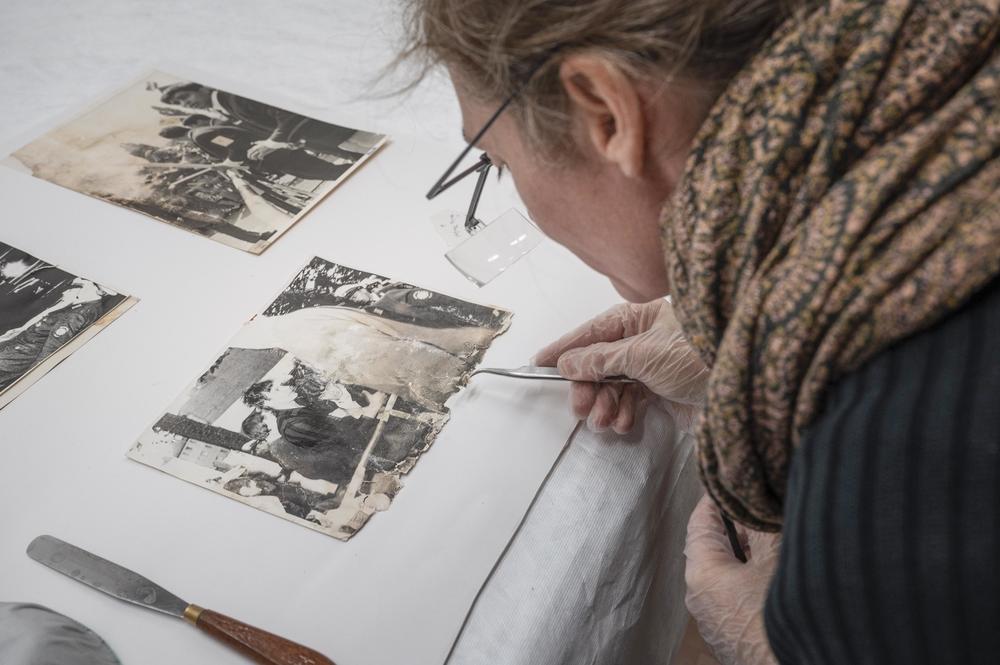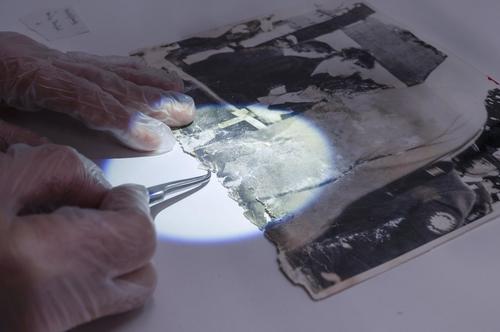Archiving and Preserving
The University Archives of Freie Universität contains unpublished photographs that document the events surrounding the visit of the Shah of Iran in 1967. Now they are being restored.
Apr 08, 2022
Photo restorer Stefanie Pfeifer is shown at work with tweezers. It is the first step in preparing the photographs for digitization in order to make them accessible to interested individuals.
Image Credit: Bernd Wannenmacher
It is June 2, 1967. Nearly 2,000 people are waiting in front of the Schöneberg Town Hall in West Berlin for the arrival of Shah Mohammad Reza Pahlavi, who is on a state visit with his wife Farah and wants to sign the city’s Golden Book. Among the many curious Berliners who have come to take a look at the Shah and his wife, there are also hundreds of students who, with loud shouts and hand-made signs, express what they think of the Persian ruler: “Murderer !” or “Welcome Mr. Dictator.”
In the crowd there are also about 150 employees of the Iranian secret service and compatriots recruited by it who loudly applaud the Shah. After he and his wife have disappeared into the Town Hall, the members of the Iranian secret service and their cohorts suddenly begin to beat the demonstrators who are against the Shah, right in front of the Berlin police.
During another anti-Schah demonstration in the evening in front of the Deutsche Oper in Charlottenburg, violent clashes erupted between the police and demonstrators. They culminated in the violent death of Benno Ohnesorg, a 26-year-old unarmed student at Freie Universität who was arrested by police officer Karl-Heinz Kurras and shot at close range.
Restoring photographs requires a great deal of patience and precision.
Image Credit: Bernd Wannenmacher
June 2, 1967, became the symbolic date of the German student movement. The events in front of Schöneberg’s town hall and in Charlottenburg are captured in photographs, including 137 previously unpublished prints that are stored in the University Archives of Freie Universität. But how did they get there?
“In 2004 we took over the APO archive – the archive of extra-parliamentary opposition and social movements,” explains Birgit Rehse, head of the University Archives. The documents included a large stock of the General Student Council, the AStA. “The AStA of Freie Universität promptly initiated a committee of inquiry into the events of June 2, 1967, with testimonies and photographs that substantiate them,” says Rehse.
Fifty-four years later, the photographs are now being restored. It is an expensive and time-consuming job. Water damage has led, among other things, to severe mold growth on the pictures. Of the 137 images, 57 are so severely affected that they are a health hazard and cannot be viewed.
Photo restorer Stefanie Pfeifer, who was commissioned by the University Archives, will need at least 150 hours to bring the pictures into a state that allows them to be digitized. Mold spores have to be removed, adhesive and fiber residues removed, cracks and folds need to be stabilized, and defects backed with Japanese paper. In addition, the photos must be repackaged in precisely fitting envelopes made of acid-free archival cardboard so that interested individuals can view the pictures without removing them from their stabilizing sleeve.
The photos are to be digitized in order to make them accessible to researchers and the public. However, this is only one reason for the restoration. Rehse emphasizes that the most important aspect is non-material She says, “Archiving means to save for the long term. Our mission is to preserve and store originals for as long as possible. This also includes carrying out protective digitization to preserve the content of the archives in a new format while at the same time giving interested individuals access to them.”
Further Information
This article originally appeared in German in WIR-Magazin, which is published by the Ernst-Reuter-Gesellschaft der Freunde, Förderer und Ehemaligen der Freien Universität Berlin e.V.
The University Archives of Freie Universität Berlin is the official repository for university records. The records are available to interested individuals. For further information and contact persons, see the website: www.fu-berlin.de/uniarchiv


